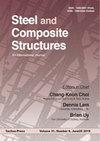Experimental study on cold-formed lipped channel stub columns reinforced by steel bars or steel strips
IF 3.9
3区 工程技术
Q1 CONSTRUCTION & BUILDING TECHNOLOGY
引用次数: 0
Abstract
In this paper, the axial compressive properties of cold-formed steel lipped channel stub columns strengthened by rebars or steel strips are experimentally studied. The experiment included two sections. A kind of columns with local buckling is reinforced longitudinally by steel strips at the web. The other is the columns with distorted buckling, which is reinforced longitudinally by steel bars at the curling edge. The failure mode, deformation characteristics, ultimate bearing capacity and load displacement curve of the specimen are obtained through the experiment. On the basis of the experiment, the calculation results of theoretical axial bearing capacity of cold-formed steel lipped channel stub columns in Chinese, North American and Australian code are compared and analyzed. Research indicates: First, the cold-formed steel lipped channel stub columns strengthened by steel bars or steel strips can effectively improve the compressive bearing capacity of the specimen. Secondly, when the initial stress ratio of specimen is less than 0.3, the reinforcement effect is ideal. Thirdly, the three standards don't stipulate the calculation of theoretical bearing capacity of the specimen strengthened after loading, so there is a large deviation between the theoretical calculation value and the test value.冷弯唇形槽型短柱配筋试验研究
本文对冷弯型钢唇形槽钢短柱的轴压性能进行了试验研究。实验包括两个部分。一种局部屈曲柱在腹板处采用钢带纵向加固。另一种是变形屈曲柱,在弯曲边缘用钢筋进行纵向加固。通过试验得到了试件的破坏模式、变形特征、极限承载力和荷载位移曲线。在试验的基础上,对中国、北美和澳大利亚规范中冷弯型钢唇形槽钢短柱的理论轴向承载力计算结果进行了对比分析。研究表明:一是采用钢筋或钢带加固冷弯型钢唇形槽钢短柱,能有效提高试件抗压承载力;其次,当试件初始应力比小于0.3时,加固效果较理想。再次,三个标准均未规定加载后加固试件的理论承载力计算,因此理论计算值与试验值存在较大偏差。
本文章由计算机程序翻译,如有差异,请以英文原文为准。
求助全文
约1分钟内获得全文
求助全文
来源期刊

Steel and Composite Structures
工程技术-材料科学:复合
CiteScore
8.50
自引率
19.60%
发文量
0
审稿时长
7.5 months
期刊介绍:
Steel & Composite Structures, An International Journal, provides and excellent publication channel which reports the up-to-date research developments in the steel structures and steel-concrete composite structures, and FRP plated structures from the international steel community. The research results reported in this journal address all the aspects of theoretical and experimental research, including Buckling/Stability, Fatigue/Fracture, Fire Performance, Connections, Frames/Bridges, Plates/Shells, Composite Structural Components, Hybrid Structures, Fabrication/Maintenance, Design Codes, Dynamics/Vibrations, Nonferrous Metal Structures, Non-metalic plates, Analytical Methods.
The Journal specially wishes to bridge the gap between the theoretical developments and practical applications for the benefits of both academic researchers and practicing engineers. In this light, contributions from the practicing engineers are especially welcome.
 求助内容:
求助内容: 应助结果提醒方式:
应助结果提醒方式:


